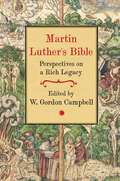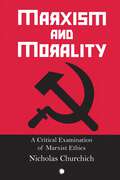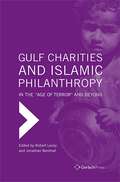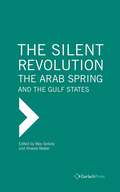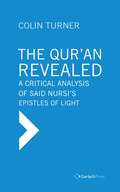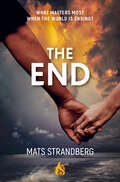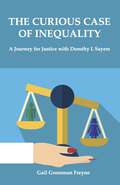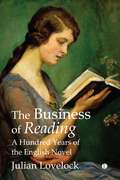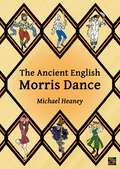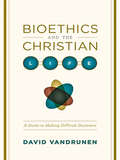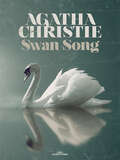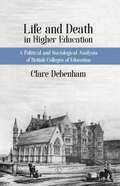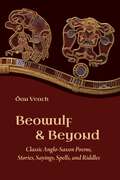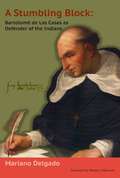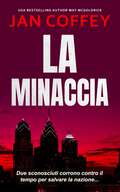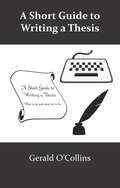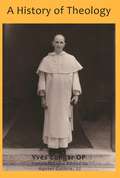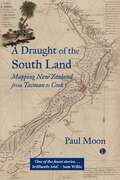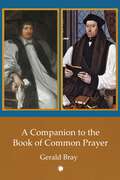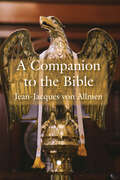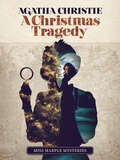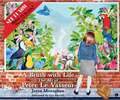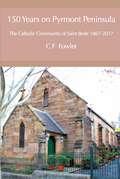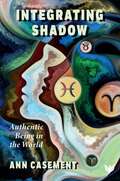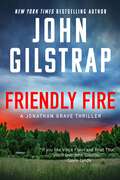- Table View
- List View
Martin Luther’s Bible
by W. Gordon CampbellMartin Luther's 1522 September Testament marked a watershed in Bible translation, making Scripture available to ordinary German people in their own tongue and sparking similar efforts across Europe. Building on the nascent trend of vernacular Bible translations in the early sixteenth century, Luther's translation quickly became definitive linguistically, theologically and culturally, especially once the complete Bible was published in 1534, with production of New Testaments and Bibles in French, English and other languages keeping pace. Luther and his associates constantly revised and improved their methodology for translation and interpretation over a quarter-century of Bible publishing - efforts that helped shape Bible translation, reading and exegesis, for scholars and ordinary Christians alike, well beyond his lifetime. Martin Luther's Bible commemorates the September Testament, exploring the Wittenberg Bible project in its context and tracing aspects of its legacy in Europe and the wider world, from the sixteenth century to the present day. Essays from a range of leading experts draw upon the 2022 Martin Luther: Bible Translator, Illustrator and Publisher International Conference held at Union Theological College, Belfast. Together, they provide critical new insights into the linguistic, hermeneutical and theological history and influence of this landmark text.
Marxism and Morality
by Nicholas ChurchichNot himself a Marxist, Dr Churchich has nevertheless won plaudits for this book from those committed to the philosophy. It is, they acknowledge, thoroughly researched, well reasoned, and balanced in its argument - even if that argument is one with which Marxists are bound to disagree, being based on the premise that 'ethical theories must ultimately rest on metaphysical and psychological preconceptions rather than on some imaginary empirical facts'. The declared aim of this work is to present a full exposition of Marx's and Engels' ideas on morality and ethics, and to indicate some of their errors and weaknesses. Unlike other studies of this subject, Churchich analyses all major aspects of morality, dealing not only with the writings of Marx himself but also with the works of most writers who have commented on Marxist morality and ethics. Marx himself intended to produce a work on social morality, but did not manage to do so. This book will therefore, and without doubt, become the standard work on his view of the subject. Superior to anything else on the topic written by non-Marxists, it is clearer on some aspects of Marx's view than the work of some Marxist writers - Churchich makes obvious for instance, how great was Althusser's mistake in arguing that there is 'not a grain of normative ethics in mature Marx'. Yet the author's objectivity allows him also to find values among the ethical arguments of Marx and Engels, making this a book which both Marxists and concerned Anglicans would find useful as a criticism of some current social trends. It also sounds a cautionary note for those who argue that the collapse of bureaucratic socialism in the former Soviet Union means the end of Marxism too - this is by no means Dr Churchich's view.
Gulf Charities and Islamic Philanthropy in the “Age of Terror” and Beyond
by Robert Lacey and Jonathan BenthallGulf Charities and Islamic Philanthropy in the "Age of Terror" and Beyond is the first book to be published on the charities of Saudi Arabia and the Arabian Gulf, covering their work both domestic and international. From a diversity of viewpoints, the book addresses: the historical roots of Islamic philanthropy in religious traditions and geopolitical movements; the interactions of the Gulf charities with "Western" relief and development institutions - now under pressure owing to budgetary constraints; numerous case studies from the Middle East, Africa, and South Asia; the impact of violent extremism on the sector, with the legal repercussions that have followed - especially in the USA; the recent history of attempts to alleviate the obstacles faced by bona fide Islamic charities, whose absence from major conflict zones now leaves a vacuum for extremist groups to penetrate; the prospects for a less politicized Islamic charity sector when the so-called "war on terror" eventually loses its salience.
The Silent Revolution The Arab Spring and the Gulf States
by May Seikaly & Khawla MattarHow immune is the Gulf region to the changes that have engulfed the Arab world since 2011? This volume responds to this question by examining the impact of the Arab Spring on Gulf regimes and societies and contributing to debates on political participation and citizenship; sectarianism, gender and identity formation; as well as the role of the media in exposing the paradoxes of the Gulf system and its relationship to international political actors.
The Qur’an Revealed: A Critical Analysis of Said Nursi’s Epistles of Light
by Colin TurnerThe Qur'an Revealed is a landmark publication in the history of Islamic studies, providing for the first time a comprehensive critical analysis of Bedizuzzaman Said Nursi's 6000-page work of Quranic exegesis, The Epistles of Light. In discussing a wide range of themes, from Divine unity to causation, from love to spirituality, from prophethood to civilization and politics, Colin Turner invites the reader into Nursi's conceptual universe, presenting the teachings of arguably the Muslim world's most understudied theologian in a language that is accessible to both expert and interested layperson alike.
The End
by Mats StrandbergWhen will the world end? With Foxworth, a massive comet, hurtling toward Earth, humanity now knows the exact date. Seventeen-year-old Simon wants to spend his last weeks with the people he cares about most, especially his goal-oriented swimmer ex-girlfriend, Tilda, who dumped him shortly after the news broke. Since Lucinda was diagnosed with cancer she's, retreated into herself preparing for the inevitable. Suddenly facing down a death that makes her the same as everyone else, she longs to connect again but doesn't quite know where to start. Reaching out to her former best friend Tilda seems like a good first step. Then Tilda is found dead and accusations start circling that Simon is the killer. As the days tick down, Simon and Lucinda only want to know the truth, but the more they uncover about the final days of the girl they both cared for deeply, the clearer the things that really matter become. Probing the question How would you spend your last days if you knew exactly when they'd run out?, The End is a taut and riveting pre-apocalyptic thriller underpinned with sharp social commentary, that blends the urgency of Neal and Jarrod Shusterman's Dry with the dark tension of Courtney Summer's Sadie.
The Curious Case of Inequality
by Gail Grossman FreyneNo one after reading this thought-provoking book will blithely assert that we are living in an age of equality between the sexes. Taking the 1930s detective fiction of Dorothy L. Sayers as a springboard and drawing on her own practice as a psychotherapist Gail Freyne makes hard-hitting points about the still unequal relationship between the sexes in the home, the workplace and society at large. In a style as engaging and accessible as Sayers's own, Freyne demolishes the notion that the postfeminist era has rendered equal rights feminism redundant.
The Business of Reading
by Julian LovelockIn The Business of Reading, Julian Lovelock charts the development of the English novel over the past hundred years. Smuggling in titles from Scotland, Ireland and the Caribbean, he focuses on twenty texts written since the end of the First World War, some well-known but others less so, placing them in their historical context. Novelists represented range from D.H. Lawrence, E.M. Forster and Virginia Woolf, through Graham Greene, Kingsley Amis and Iris Murdoch, to such contemporary writers as Ian McEwan, Maggie O'Farrell and Graham Swift. Written in a lucid style that reflects his expertise and enthusiasm, Lovelock's innovative selection, perceptive analysis and lightness of touch will appeal to the general reader, the book club member and the student. He argues that our response as readers is an important part of the creative process, and while he mainly avoids the critical '-isms' that have characterised recent academic debate, he introduces such concepts as intertextuality, metafiction and the role of the often unreliable narrator, showing how an appreciation of the way the language of fiction works can only add to our understanding and enjoyment.
The Ancient English Morris Dance
by Michael HeaneyThe idea that morris dancing captures the essence of ancient Englishness, inherently carefree and merry, has been present for over four hundred years. The Ancient English Morris Dance traces the history of those attitudes, from the dance's introduction to England in the fifteenth century, through the contention of the Reformation and Civil War, during which morris dancing and maypoles became potent symbols of the older ways of living. Thereafter it developed and diversified, neglected and disdained, until antiquaries began to take an interest in its history, leading to its re-invention as emblematic of Victorian concepts of Merrie England in the nineteenth century. The quest for authentic understanding of what that meant led to its revival at the beginning of the twentieth century, but that was predicated on the perception of it as part of England's declining rural past, to the neglect of the one area (the industrial north-west) where it continued to flourish. The revival led in turn to its further evolution into the multitude of forms and styles in which it may be encountered today.
Bioethics and the Christian Life: A Guide To Making Difficult Decisions
by David VanDrunenThough a relatively new discipline, bioethics has generated extraordinary interest due to a number of socially pressing issues. Bioethics and the Christian Life places bioethics within the holistic context of the Christian life, both developing a general Christian approach to making bioethics decisions and addressing a number of specific, controversial areas of bioethics. Clear, concise, and well-organized, the book is divided into three sections. The first lays the theological foundation for bioethics decision making and discusses the importance of wisdom and virtue in working through these issues. The second section addresses beginning-of-life issues, such as abortion, stem-cell research, and infertility treatments. The third section covers end-of-life issues, such as living wills, accepting and refusing medical treatment, and treatment of patients in permanent vegetative states.
Swan Song
by Agatha Christie CoolturaThe famous soprano Paula Nazorkoff is hired for a private performance. While the staging is taking place, one of the protagonists dies. And only diving into the distant past the truth will emerge.
Life and Death in Higher Education
by Clare DebenhamThis study is the result of many years of research but is topical because of the current teacher shortage. At its peak in 1961 there were 40,000 men and women who entered colleges of education in Britain compared to 50,000 who entered traditional universities. There have been interesting histories of individual colleges but this book takes a holistic approach which was supported by the historian Professor Asa Briggs. This controversial study is packed with fascinating facts that will intrigue and inform readers. As well as the relationship between colleges and schools social issues are analysed such as the role of working class teachers and the battles of women staff and students. New evidence is provided for the colleges' expansion and their sudden closure. The study draws on undiscovered official and local archival sources. An important feature is the testimony drawn from interviews from former college students, the oldest being 101 years. This immensely readable book appeals to general readers as well as specialist historians of education. It is of particular interest to teachers, especially those whose institutions were originally colleges of education. Political scientists and sociologists will find much of relevance, as will feminists who have enjoyed Debenham's last two published books.
Beowulf & Beyond
by Dan VeachBeowulf & Beyond is the first and only poetic translation to include not only Beowulf but all the best-known works of Anglo-Saxon literature in one convenient volume. Previously, students have had to buy a separate book to read essential works like "The Seafarer," required reading in all courses of early English literature. And even these may miss some of the greatest delights of this period: the wonderful stories from Bede, the charms, sayings, spells and riddles that inspire students to delve deeper into this strange and magical world. These translations, which derive their power from cleaving "close to the bone" of the original Anglo-Saxon, capture the power and punch of the original in a supple verse that sweeps the reader onward irresistibly.
A Stumbling Block
by Mariano DelgadoThis book presents the work and thought of Bartolome de Las Casas, taking into account his hunger and thirst for justice for the peoples of the New World, discovered and dominated by the Spanish. Las Casas defends the right of Amerindian peoples to live in freedom, to resist Spanish rule, to respect and preserve their own cultures, to respect their religiosity and to preserve after conversion the elements compatible with Christianity, to reject a Christianity preached in the shadow of arms. The defence of these rights and of the unity and equality of the human family makes Bartholomew de las Casas a "forerunner" both of the Second Vatican Council and of the post-colonial and globalized world of our time. Bartolome de Las Casas has become an important figure in the history of the church and of humanity and in the history of literature and of art. Las Casas, who called himself 'a Christian, a religious, a bishop, a Spaniard' (Las Casas, In Defense, 21), - note the sequence is above all else, however, a 'prophet' in the biblical sense of the word: one called by God who persistently-conveniently as well as inconveniently-reminds his contemporaries of the demands of the word of God in the face of the injustice which causes the suffering and misery of one's neighbor. Many such witnesses have been officially recognized and canonized by the church. Others, though, have been covered with the cloak of slander to this day; they are still waiting for us to muster the courage to pull off this cloak and to incorporate their irksome witness into the prophetic tradition of the Church.
La Minaccia
by Jan Coffey May McGoldrickPoche settimane prima del Giorno dell'Indipendenza, il Presidente diventa l'obiettivo di un attentato ordito da un potente cartello finanziario deciso a strappare via il sogno americano. Solo due persone si ergono tra un disastro nazionale e una celebrazione gloriosa... e il tempo sta per scadere. Una preziosa bandiera cucita dalla leggendaria Betsy Ross - un cimelio di storia americana dal valore incalcolabile- è scomparsa e l'agente speciale dell'FBI Nate Murtaugh ha solo dieci giorni per ritrovarla. La sua ricerca lo porta nel mondo dell'arte di Philadelphia e a Ellie Littlefield. Figlia di un noto falsario, è un'abile commerciante di antichità americane. Ellie ha conoscenze nel mondo dell'arte e Murtaugh farà di tutto per convincerla ad aiutarlo. Mentre scatta il conto alla rovescia per il Giorno dell'Indipendenza, Ellie e Nate devono destreggiarsi in un mondo in cui la verità e la menzogna sono difficili da separare, in cui l'omicidio è solo un modo di fare affari e in cui gli intermediari del potere aziendale si rifiutano di permettere a chiunque - persino al Presidente degli Stati Uniti - di ostacolare i profitti.
A Short Guide to Writing a Thesis
by Sj Gerald O’CollinsThis book is about how postgraduate students might choose a topic for their thesis that they can investigate and turn into a short paper or a long dissertation. The book looks at questions like the following. What should feed into their choice of a supervisor? How should they compile and organise their bibliography and set about writing the introduction? What are some tips for writing paragraphs and entire chapters and producing conclusions? What are ways of providing references, using helpful (or at least correct) punctuation, avoiding common mistakes in spelling, and improving their level of writing? When difficulties arise for instance, with their supervisor, how might they cope with and resolve such difficulties? This book is a guide. It aims to offer straightforward suggestions about doing research, putting the results into a convincing form, and dealing with difficulties that inevitably arise. The overall objective of this book is to provide students and their supervisors with some down-to-earth proposals about things to do and things to avoid when preparing and producing a long essay or a thesis. This book is the result of many years of teaching and supervising students.
A History of Theology
by O. P. Yves M.J. CongarThese pages offer a new edition of Yves Congar's A History of Theology, which was originally published in the 1960s. This work began as a lengthy article appearing in the multi-volume Dictionnaire de Theologie in 1946 entitled 'Theologie'. Congar wrote that he, Fr M-D Chenu OP, and Fr Henri-Marie Feret OP in the 1930s planned a book of this type.
A Draught of the South Land
by Paul MoonThe story of how the map of New Zealand emerged is a fascinating one. The first full map of the continent was published in London in 1773, which might seem the natural starting point, but over the preceding 150 years, fragments of charts and intelligence about New Zealand ricocheted around various parts of the world. In A Draught of the South Land: Mapping New Zealand from Tasman to Cook, Paul Moon provides the first comprehensive account of this piecemeal process. Moon's investigation covers several continents over more than a century, and reveals the personalities, blunders, strategic miscalculations, scientific brilliance, and imperial power-plays that were involved. Above all, he examines the roles played by explorers and traders, M?ori and European rulers, scientific societies and military groups, as well as specialist cartographers and publishers. At a time when maps as colonial tools, enablers of trade and objects of curiosity are being studied anew, his careful analysis and engaging narrative will be of interest to scholars everywhere.
A Companion to the Book of Common Prayer
by Gerald BrayThe Book of Common Prayer stands as one of the greatest achievements of the English Reformation. Although increasingly replaced by more modern forms, it remains the foundation of Anglican worship and a succinct expression of Anglican doctrine as received by its sixteenth and seventeenth-century authors. It is therefore a text to be treasured and used, both for its historical insight into the Church of England's theological origins, and for its continued value as an enriching liturgical resource. In this Companion, Gerald Bray provides a practical guide to the 1662 text and its underlying doctrinal basis. Outlining its development from the first version of the prayer book in 1549, through the Elizabethan settlement and the upheaval of the civil war and protectorate, he shows that many of the liturgical controversies and debates we see today are nothing new. With the inclusion of a summary of the history of the text, and an extensive bibliography for further reading, A Companion to the Book of Common Prayer will unlock this seminal text for a fresh generation of worshippers.
A Companion to the Bible
by Jean-Jacques von AllmenIn clear and concise fashion, A Companion to the Bible provides explanation of many terms and key themes within the Bible. Grounding the definitions with textual references, Jean-Jacques von Allmen enriches our theological understanding by concentrating on a limited number of longer articles with abundant cross-referencing. This approach allows for a greater depth in knowledge for all readers. Written in an accessible style, this book is for layfolk and scholars alike. As von Allmen himself writes, the book's aim is to facilitate this 'one thing needful' - to encounter, through Holy Scripture, Jesus Christ the Word of God.
A Christmas Tragedy
by Agatha Christie CoolturaMiss Marple surprises all the members of The Tuesday Night Club with a case in which their suspicions could be misleading; and Agatha Christie will demonstrate that even experts can sometimes fail when it comes to solving a mystery.
A Brush with Life
by Jason MonaghanPeter Le Vasseur's art depicts the beauty of the world and the pressure that humankind exerts upon it. Not content with merely creating highly researched nature art, his work carries an ecological message often ahead of its time. Unusually for an artist he builds in the detail of contemporary life during the decades through which he has lived, painting in a meticulous and distinct style. He escaped the Channel Island of Guernsey with his parents just before the German Occupation in 1940 and grew up in London as a refugee. Winning a scholarship to art college he went on to create pop art for one-man shows in major London galleries and sold to the Beatles, film stars and aristocracy. In A Brush With Life, Jason Monaghan presents the definitive work on Le Vasseur's life and work, charting his progression from pop art and fantasy to political pieces, book illustration and environmental paintings. Never depressing, the messages of both artist and author are thoughtful, and sometimes ironically amusing. Throughout, Le Vasseur's central philosophy is evident: where nature survives, hope remains.
150 Years on Pyrmont Peninsula
by C F FowlerSt Bede's Catholic Church in Pyrmont Street is the oldest, continuously functioning church on the Pyrmont peninsula. The Sydney Morning Herald article on the laying of the foundation stone (7/2/1867) stated that, when completed, the new church would be "a very neat and elegant structure".
Integrating Shadow: Authentic Being in the World
by Ann CasementSince its inception, the notion of shadow is recognised as one of Jung's major contributions to the world of psychology. Shadow traits are often unconsciously felt to be threats to our self-image, so we use defence mechanisms, such as repression and denial, to dismiss its existence and place it on to others, either in the personal or collective sphere. Although there exists considerable overlap between the strands, dividing the shadow into three constituent parts, personal, collective, and archetypal, helps to fully explore its impact on the world. The personal shadow is usually viewed as the base, inferior part of personality, although it can also include positive aspects, but it needs to be acknowledged and incorporated to make an individual whole. The collective shadow is found in many dark periods of history: witch hunt trials, religious wars, the Holocaust, and Rwandan genocide to name but a few; in today's world, it is spread at the speed of light by mass media. The archetypal shadow emanates from the realm of the collective unconscious and may be equated with evil. Alongside shadow is the inextricably linked concept of persona, the outer face that is presented to the world, which is also explored in detail, as well as the role of the shadow in the act of scapegoating and within the professional sphere, and Jung's links to the social sciences, in particular anthropology and sociology. Shadow is a theme that Ann Casement returned to many times in her decades-long career, always finding new ways to explore and explain it. Integrating Shadow: Authentic Being in the World brings together these many years of presentations and research to present a multi-layered and rich discourse on the meaning, importance, and consequences of the shadow in all our lives.
Friendly Fire (A Jonathan Grave Thriller #8)
by John GilstrapA seemingly random act of violence leads a rescue specialist to uncover a terrorist conspiracy in this thriller by the New York Times bestselling author. It begins with a shocking act of vengeance. Barista Ethan Falk chases a customer into the parking lot and kills him. He tells police that years ago the older man abducted and tortured him. Then Ethan's story takes an even stranger turn: he says he was rescued by a guy named Scorpion. Of course, there is no record of either the kidnapping or the rescue, because Scorpion--Jonathan Grave--operates outside the law and leaves no evidence. Now Grave must find a way to defend the young man without blowing his cover. And the task takes on new urgency when he learns the dead man was connected to an ongoing terrorist plot against America. It's up to Grave and his team to stop it. But first they must rescue Ethan Falk—a second time.
